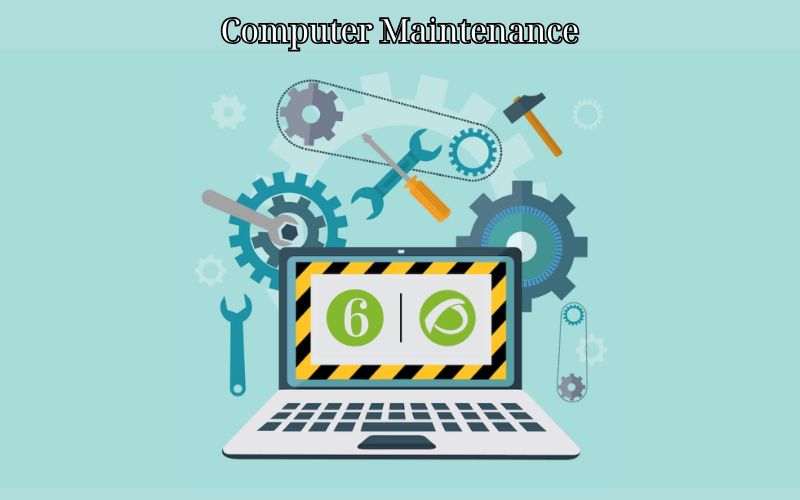Proper computer maintenance is essential for ensuring the longevity and performance of your device. Whether you use your computer for work, gaming, or everyday browsing, regular upkeep can help avoid common issues like slow performance, overheating, or hardware failure. Rdpoi.xyz provides essential tips and best practices to maintain your computer in optimal condition.
Why Computer Maintenance Matters
Computer Maintenance benefits you in several ways:
- Improved Performance: Regular cleaning and updates keep your device running smoothly.
- Increased Lifespan: Proper care reduces wear and tear on hardware components.
- Enhanced Security: Routine checks help prevent malware and cyberattacks.
- Cost Savings: Avoid expensive repairs or replacements with consistent maintenance.
Essential Computer Maintenance Tasks
1. Keep Your System Updated
Operating system updates often include security patches, performance improvements, and new features.
Tips:
- Enable automatic updates for your operating system (Windows, macOS, etc.).
- Regularly update drivers for hardware components like graphics cards and printers.
- Update software and applications to ensure compatibility and security.
2. Manage Your Storage
An overloaded hard drive can slow down your computer.
Steps to Optimize Storage:
- Clean Temporary Files: Use built-in tools like Disk Cleanup (Windows) or Storage Management (macOS).
- Uninstall Unused Applications: Remove programs you no longer need.
- Organize Files: Create folders to sort documents, photos, and other data.
Pro Tip: Consider using cloud storage or an external drive to free up space on your computer.
3. Protect Against Malware and Viruses
Cyber threats are a major concern for computer users.
Steps to Enhance Security:
- Install reliable antivirus software and keep it updated.
- Avoid clicking on suspicious links or downloading unverified files.
- Enable a firewall to block unauthorized access to your network.
4. Keep Hardware Clean
Dust and debris can accumulate in your computer, causing overheating and component damage.
How to Clean Your Computer:
- Use a soft cloth to wipe down the exterior.
- Use compressed air to remove dust from the keyboard, vents, and fans.
- For desktop PCs, clean the inside of the case periodically, ensuring the computer is powered off and unplugged.
Advanced Computer Maintenance Tips
1. Optimize Startup Programs
Many programs launch automatically when your computer starts, which can slow down boot time.
How to Manage Startup Programs:
- On Windows: Use the Task Manager to disable unnecessary startup items.
- On macOS: Go to System Preferences > Users & Groups > Login Items.
2. Monitor System Performance
Track your computer’s performance to identify potential issues early.
Tools to Use:
- Task Manager (Windows) or Activity Monitor (macOS) to monitor CPU, RAM, and disk usage.
- Hardware diagnostic tools provided by your computer’s manufacturer.
3. Backup Your Data
Data loss can occur due to hardware failure, malware, or accidental deletion.
Backup Methods:
- Use an external hard drive or SSD for regular backups.
- Opt for cloud storage solutions like Google Drive, iCloud, or OneDrive.
- Schedule automatic backups for added convenience.
4. Regularly Defragment Your Hard Drive
For traditional hard drives (HDDs), defragmentation reorganizes fragmented data to improve speed.
Steps:
- On Windows: Use the “Defragment and Optimize Drives” tool.
- On macOS: Defragmentation is not usually necessary, as the system handles it automatically.
Note: Defragmentation is unnecessary for solid-state drives (SSDs).
Signs Your Computer Needs Maintenance
- Slow Performance: Apps take longer to open, or the computer freezes frequently.
- Overheating: The device becomes unusually hot during normal use.
- Strange Noises: Clicking or grinding sounds could indicate a failing hard drive or fan.
- Error Messages: Frequent pop-ups or system crashes suggest software or hardware issues.
Best Practices for Long-Term Computer Maintenance
1. Use a Surge Protector
Power surges can damage your computer’s components. A surge protector safeguards against unexpected voltage spikes.
2. Avoid Overcharging Laptops
Prolong battery life by unplugging your laptop once it’s fully charged. Modern laptops often include features to optimize charging, so check your settings.
3. Maintain Proper Ventilation
Prevent overheating by ensuring your computer is placed in a well-ventilated area. Avoid blocking vents or placing the device on soft surfaces like beds or couches.
4. Be Mindful of Software Installations
Only install software from trusted sources to avoid malware and bloatware.
Professional Computer Maintenance Services
Sometimes, professional assistance is necessary for tasks like:
- Replacing or upgrading hardware components (e.g., RAM, SSD, GPU).
- Deep cleaning internal parts of the computer.
- Diagnosing complex software or hardware issues.
When to Seek Help:
If your computer exhibits persistent problems despite regular maintenance, consult a certified technician.
Conclusion
Computer maintenance is not just a one-time task—it’s an ongoing commitment to keeping your device in top condition. By following these tips and practices, you can enhance your computer’s performance, extend its lifespan, and avoid costly repairs.
